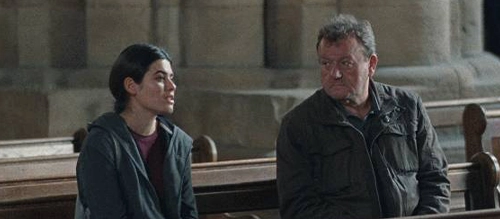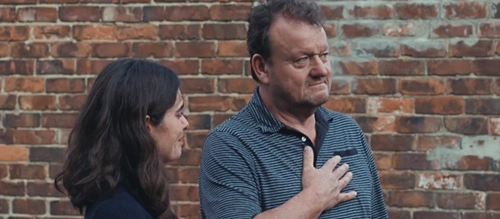
The Old Oak (2023)
Director: Ken Loach
Screenwriter: Paul Laverty
Starring: Dave Turner, Ebla Mari, Claire Rodgerson, Trevor Fox, Chris McGlade, Col Tait, Jordan Louis, Chrissie Robinson, Chris Gotts, Jen Patterson, Arthur Oxley, Joe Armstrong, Andy Dawson, Maxie Peters
“There’s no shame in love.” More people ought to remember that.
Renowned social realist Ken Loach has returned to the screen in 2023 at the age of 87 to direct what is believed to be his final film. The director, whose previous work has earned him two Palme d’Or awards (Best Film awards) from the Cannes Film Festival, as well as a further thirteen nominations across five decades, follows his workplace rights drama Sorry We Missed You with a tale about Syrian refugees moving into one of the United Kingdom’s forgotten towns. The Old Oak, written by Loach’s usual collaborator Paul Laverty (a former human rights lawyer and the screenwriter behind 2016 Palme d’Or winner I, Daniel Blake) and titled after the local pub of this unspecified North East location, is a typically realistic depiction of the people living outside of the cities most-often thought about, those with voices from beyond the small group that we ordinarily hear from.
Shot in beautiful Kodak film stock, complete with that crisp unmatched definition and the odd scratch mark, The Old Oak is a uniquely cinematic film that highlights the beauty of capturing life (both in how it is made and through a character in the film who has an interest in photography) whilst speaking with truth on the act of struggling through it. It is a poignant, meaningful, and in parts self-reflective film that illustrates Loach’s talents for presenting truthful stories and directing believable performances from untrained and unknown actors. It is a drama with enough dour reality to make you cry and enough faith in humanity to make you cry all over again, a typically Loachian blast of emotion that you won’t want to miss.
That’s the sugar. Here’s the medicine…
It’s 2023, and if you’re not aware of the state of forgotten towns with £8,000 homes and entire families going without heating or electricity just so they can feed themselves, then you need to wake up. People who’ve lived in the same street for fifty years are maintaining gardens next to boarded up houses, entire postcodes are being quietly abandoned by their local councils. More than one in four children (29% to be exact) are living in poverty, that’s 4.6million children in the fifth richest country in the world. People are too embarrassed to leave the house, are walking around in clothes that are decades old, are struggling to make ends meet. The United Kingdom is falling apart, but all we ever hear from the billionaire-owned news media is ‘fear the foreigner’, ‘they’re coming on boats’, ‘they’re taking your child’s spot in school’ – recently, it has been a lot to do with asylum seekers “faking their homosexuality to gain access to the UK”. It’s always point down, point to the side; your neighbour’s your enemy, not us. Meanwhile, a headline in The Telegraph, a UK newspaper owned by channel islands billionaire Frederik Barclay (who is worth £6.4billion and has a yacht stationed in Monaco that costs £4million per year to maintain), reads that “Ken Loach has become a tiresome, humourless parody of himself”. Funny, because from where many of us are standing, he is the only one speaking truth to power.
In a film industry that was disembowelled post-2008 financial crash by a conservative government selling off anything it could at massively reduced rates to its mates – the closure of BAFTA-LA, the reclassification of “British film” into something so vague that a number of Mission: Impossible films have been classified as “British” and thus earned tax reductions, the current crisis of the British film industry being held together by Hollywood interests, and the transition of the UK from a world power in cinema to a post-production house – has ensured that voices from underprivileged backgrounds have less frequently found their way to the screen, and that they have even more infrequently found any kind of traction with audiences. A national cinema that once so proudly boasted a number of top directors making financially successful and critically acclaimed films about their own nation – the results being the likes of Brassed Off (César Best International Film winner), The Full Monty (4-time Oscar-nominee, 1-time winner for music), Little Voice (Actress in a Supporting Role nominee at the Oscars), This Is England (Best British Film winner at the BAFTAs), and Trainspotting (Oscars nominee, BAFTA winner for screenplay) – has been reduced to London-centric pseudo-independents or stereotypical tales of monarchy, the majority of fresh projects now destined for television anyway. There have been a number of interesting and exciting outliers, but these films are the exceptions that prove the rule, the filmmakers who once seemed like natural hitmakers forced to settle for television deals (as was the case with a recent Shane Meadows project) or simply stop making stories about their area altogether. The fact that the guy who directed Kes in 1969 is the only person who can get a film made in the North East and screened nationally is a sad indictment of the film industry; think of all those voices we’ve missed out on, all those people who could have felt seen for the first time in their lives.

The Old Oak is everything it was described as being in the opening paragraphs of this piece. It looks beautiful, and it brings attention to the art of capturing and the joy of watching in a way that you can’t help but to understand as self-reflection from one of the great filmmakers in the United Kingdom’s history. It features all the hallmarks of top class social realism both in how it’s made and the story that it tells – Syrian refugees are presented as if a parallel to UK miners during the mining strikes of the 1980s, which is particularly emotionally resonant to those familiar with the people and places affected by the closures of the mines. The performances are naturalistic, at times incredibly moving. But it is also the same clenched fist call to arms that Loach’s best work has always been; a ginormous megaphone for the people living on the fringes, the people who have been forced to think that their lives are meaningless. It’s a celebration of who we are and an indictment of the forces that cause friction between us through pointless wedge topics. The Old Oak is artistically accomplished, intricately written, and phenomenally well-directed, but as is the case with every single Ken Loach movie, it is more importantly representative of a feeling amongst people who are not heard in newspapers, are not broadcast in television debates, are not represented in any other form of accessible modern day art or any of our modern day media.
It is perhaps a little too optimistic for anyone living through the circumstances depicted, but in that way it is a celebration of the lives that continue through the mud that is routinely thrown on them. It is also clear that we are living in a time when wealth disparity has poisoned all corners of our consumption to such an extent that this film won’t be seen by anyone unwilling to have their limited perspective on life widened, so The Old Oak likely won’t change the public narrative either. But The Old Oak is important, and it will be remembered. It will be renowned for its unique artistry and eventually celebrated for how Ken Loach has once again captured how so many of us feel.
Ignore what the naysayers spout for they do not know the weight that you carry in your bones when you live a life like those depicted in The Old Oak. Ken Loach just made another very important film.
Score: 23/24

